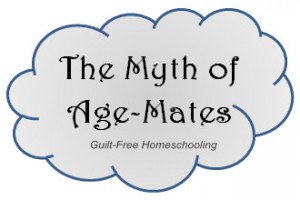To leave or not to leave — the house, that is, with your children during “school hours.” Many new homeschooling families wonder if they must cloister themselves at home until that magic hour when the public schools dismiss for the day — and only then could they dare to venture forth. If we truly see education as a non-stop enterprise, then we must also hold that education can and will occur in the marketplace as well as at the dining room table. But how should one respond to the nosy clerk or shopper who snidely asks, “Why aren’t you children in school?”
It has been my experience that a ready answer delivered with confidence will deter most busybodies, while uncertain hesitancy just provokes more questions. Therefore, we began our occasional daytime excursions prepared to deliver a carefully rehearsed response — “We have a half-day off today,” although I do not recall ever actually having to use that particular reply. Some people never asked why my children were not in school — evidently they saw nothing unusual, or they were already used to homeschoolers. The people who did ask us questions either stopped after our first response or continued to question, genuinely curious about homeschooling — which my children and I were only too happy to answer.
I remember reading once about a clerk who asked a child what school he went to. The student replied, “We HOMEschool!” The puzzled clerk repeated “Weehome School? Where’s that?” When my children were asked why they were not in school, they usually spoke up eagerly, proclaiming “WE homeschool!” and offering a further explanation: “This IS school — we’re comparing prices for math class!” Any time we shopped, value was a primary goal, so we were always comparing prices, sizes, and ingredients. We once were threatened by a zealous supermarket assistant manager, who felt our daughter’s in-depth, store-to-store comparison of brands and prices was going too far. My husband asked for the head manager, who then became uniquely interested in our project. We left the store after completing our price survey — with the manager’s apology and a $25 gift certificate, and he happily kept a photocopy of our research of his competitors.
Usually, my children boasted that they had already finished their work for the day and were therefore free to spend the remainder of the day in their choice of pursuits. It is not our fault that the public schools are such an inefficient form of education that it takes them seven hours to complete what we could accomplish in two hours. In our first year, I felt as if we must not be dedicating sufficient time to our lessons because we got them done so quickly. Then I realized that if we were to spend as many hours in session as the public schools did, we would complete our entire school year in only a few weeks or months. A brief analysis of the public school’s daily schedule reveals how much of their time is completely wasted: waiting for the teacher to take attendance and complete other daily records; waiting for quiet so the teacher can give instructions; waiting for the teacher to repeat the instructions to all those who were not listening or could not hear because of the noise made by the others who were not listening; waiting for the other students to complete the lesson so you can move on to the next one; waiting for the teacher to gain control over the discipline-challenged student in the back of the room; waiting for all the students to line up properly to move from Room A to Room B; waiting, waiting, waiting. The time they spend on actual lessons is comparable to our time spent on homeschool lessons.
After the first few years, we outgrew our timidity and began boldly going where no schoolchildren had gone before. I preferred making our trips to the grocery store or Wal-Mart during the day, because there were fewer customers during those hours, and we could do our shopping more efficiently. Our schoolwork could be done any time — we wanted to take advantage of the best hours for our shopping. We confidently marched forth, practically daring people to ask why we were not in school. I began to call those opportunities “speech class” — knowing my children would jump at the chance for on-the-spot experience in public speaking. They were not at all shy when it came to boasting about their homeschool accomplishments, and their confident grasp of language and vocabulary usually left their interviewers astonished and speechless.
Our city’s public library is normally a quiet haven during the afternoons, hosting only a few senior citizens in the reading room. We happened to be there one day when a busload of middle-school children came in, supposedly to work on research projects. The noise level increased so dramatically that my children and I could no longer hear each other without shouting, face to face. The public school students (the ones with all those well-publicized “socialization” skills) ran all over the multi-level building, chasing, teasing, shouting, and generally disrupting everything without doing any actual research. The sole teacher with the large group of students could only be in one area at a time, leaving the bulk of her group unsupervised to wreak havoc and drive off any other daytime patrons. We finally packed up our books and went home; I did not want my children to be accidentally considered part of that rowdy group, and it was no longer an enjoyable place to be. It was no wonder that the librarian in the children’s section was always happy to see my children — they knew how to behave.
A year ago, I drove my mother-in-law to her physical therapy appointment and sat in the waiting area until she was finished. While I was reading my book, a young boy came in with his mother for her appointment, obviously during school hours. He had an apple in one hand, his Bible in the other hand, quietly took a seat near me, and promptly began reading. I broke into a huge grin as I recognized the telltale signs of a homeschooler. No situation is disrupted by a well-mannered child.
Recess was an uncomfortable concept during our first year of homeschooling. I felt (silly me) that we should start by following the “school model” of regularly timed breaks with me present as the adult playground supervisor. I soon realized that this was HOMEschool, not SCHOOL at home. This was, after all, MY home, not a concentration camp. I still lived in America, the nation with the most freedom on the planet, and homeschooling was LEGAL. Public school teachers do not have to prepare the mid-day meal for their students; I did and needed extra time for it. Government schools also take their students on boondoggled field trips all the time, so we should enjoy the same freedom. (After we had left the public school system, I learned from both of my children that they had been on several trips away from the school grounds without my knowledge or permission. So much for parents’ rights.)
I loosened up and allowed my children to take their lunch break at the times that best worked into their schedules, sometimes varying with each day as they finished a subject early or needed a little extra time. I allowed them to play outdoors in our fenced backyard UNsupervised (gasp). I allowed them to take schoolwork outdoors on beautiful days to soak up some natural vitamin D and fresh air. I allowed them to ride their bicycles or rollerblades in front of the nearby middle school, even though the institution’s occupants became quite distracted at the sight. (After a heckling incident during the public school’s outdoor PE class, my son restricted his bicycling to during their classroom times. Years later, a boy began a conversation with my son by saying, “Hey, you’re that kid who used to ride your bike outside my school!”) We took walks together, whenever and wherever we wanted, knowing that even the simple act of walking around the block provided us with educational experiences in observing nature, architecture, or a street repair crew.
Time is the great healer — a little experience will give you the confidence to tackle anything during your homeschool days. Once you recognize that education happens wherever you are, whatever you are doing, you should have no qualms about leaving your home during “school hours.” Let the busybodies ask their questions — and give them more answers than they expected.






 Guilt-Free Homeschooling is the creation of Carolyn Morrison and her daughter, Jennifer Leonhard. After serious disappointments with public school, Carolyn spent the next 11 years homeschooling her two children, from elementary to high school graduation and college admission. Refusing to force new homeschooling families to re-invent the wheel, Carolyn and Jennifer now share their encouragement, support, tips, and tricks, filling their blog with "all the answers we were looking for as a new-to-homeschooling family" and making this website a valuable resource for parents, not just a daily journal. Guilt-Free Homeschooling -- Equipping Parents for Homeschooling Success!
Guilt-Free Homeschooling is the creation of Carolyn Morrison and her daughter, Jennifer Leonhard. After serious disappointments with public school, Carolyn spent the next 11 years homeschooling her two children, from elementary to high school graduation and college admission. Refusing to force new homeschooling families to re-invent the wheel, Carolyn and Jennifer now share their encouragement, support, tips, and tricks, filling their blog with "all the answers we were looking for as a new-to-homeschooling family" and making this website a valuable resource for parents, not just a daily journal. Guilt-Free Homeschooling -- Equipping Parents for Homeschooling Success!

Recent Comments